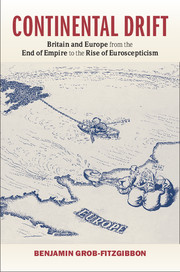Book contents
- Frontmatter
- Dedication
- Contents
- Acknowledgements
- List of abbreviations
- Introduction
- Part 1 Imperial Europeans
- Part 2 Post-imperial Eurosceptics
- 10 At sixes and sevens
- 11 Towards the Common Market
- 12 The rise of the anti-Marketeers
- 13 Empire eclipsed, Europe embraced, Britain rejected
- 14 Entering the promised land? Britain joins ‘Europe’
- 15 Seasons of discontent
- 16 Half-hearted Europeans
- 17 Mrs Thatcher, John Major and the road to European Union
- Conclusion: Post-imperial Britain and the rise of Euroscepticism
- Notes
- Bibliography
- Index
11 - Towards the Common Market
from Part 2 - Post-imperial Eurosceptics
Published online by Cambridge University Press: 05 May 2016
- Frontmatter
- Dedication
- Contents
- Acknowledgements
- List of abbreviations
- Introduction
- Part 1 Imperial Europeans
- Part 2 Post-imperial Eurosceptics
- 10 At sixes and sevens
- 11 Towards the Common Market
- 12 The rise of the anti-Marketeers
- 13 Empire eclipsed, Europe embraced, Britain rejected
- 14 Entering the promised land? Britain joins ‘Europe’
- 15 Seasons of discontent
- 16 Half-hearted Europeans
- 17 Mrs Thatcher, John Major and the road to European Union
- Conclusion: Post-imperial Britain and the rise of Euroscepticism
- Notes
- Bibliography
- Index
Summary
‘No matter how much this fact may shock you, our future is in Europe not in the Commonwealth’. So opined the Daily Mail on Friday, 16 June 1961. George Murray, the lead writer, gently informed his readers that Britain's imperial past was now over and that its present (as well as its future) lay with the European continent: ‘The British Empire, like all others, was built by power and sustained by power. When that power was removed the edifice began to crumble’. Over the past decade, this loss of power had become plain for all to see. When the British government tried to ‘assert … her rights at Suez in 1956’, the United States government showed the world that Britain could no longer act in a unilateral way. Would Britannia, Murray asked, ‘have allowed the Royal Navy to sink to the position of a bad third if she could have prevented it? Or the R.A.F., which saved freedom in 1940, [to become] so small compared with the U.S. bomber fleet? Or … Britain [to] consent to be defended by American missiles based on her own soil?’ These were the facts, Murray insisted, but not ones that should bring shame on the country: ‘On the contrary, this is the price Britain has paid for her lone stand in 1940 and 1941’. And what of the Commonwealth, if the Empire had now gone? It was a ‘noble experiment in multi-racial relations’ which had been held together ‘partly by sentiment and tradition, and partly by economic ties’. Both of these had now ‘lost a great deal of their force’. As the march of time continued, Britain's ties with the Commonwealth would become only looser; it was certainly no guarantee of a future world role for the United Kingdom.
This, then, left only Europe as the vehicle in which Britain's future greatness could be driven, and it was right and proper that this be the case: ‘Britain is essentially a European country. She has derived her strength from Europe, and the Empire was built up through her assertion of power on the Continent’. It was from European ground that the fountain of empire had sprung, and once the river which flowed from that fountain ran dry, the European ground below would remain – eroded, perhaps, but still viable.
- Type
- Chapter
- Information
- Continental DriftBritain and Europe from the End of Empire to the Rise of Euroscepticism, pp. 249 - 276Publisher: Cambridge University PressPrint publication year: 2016



